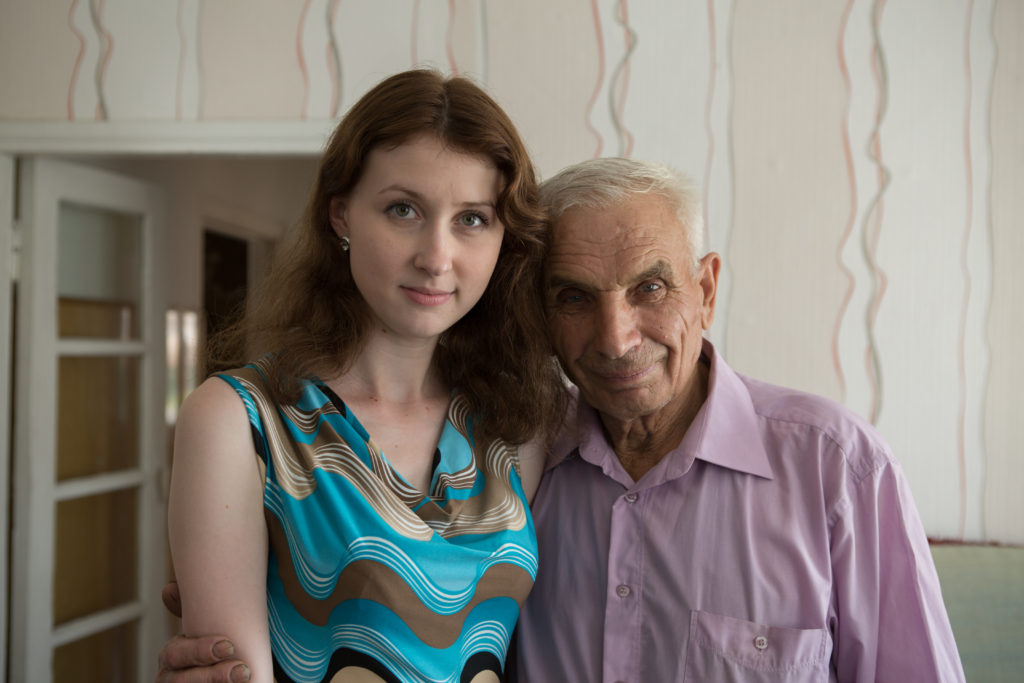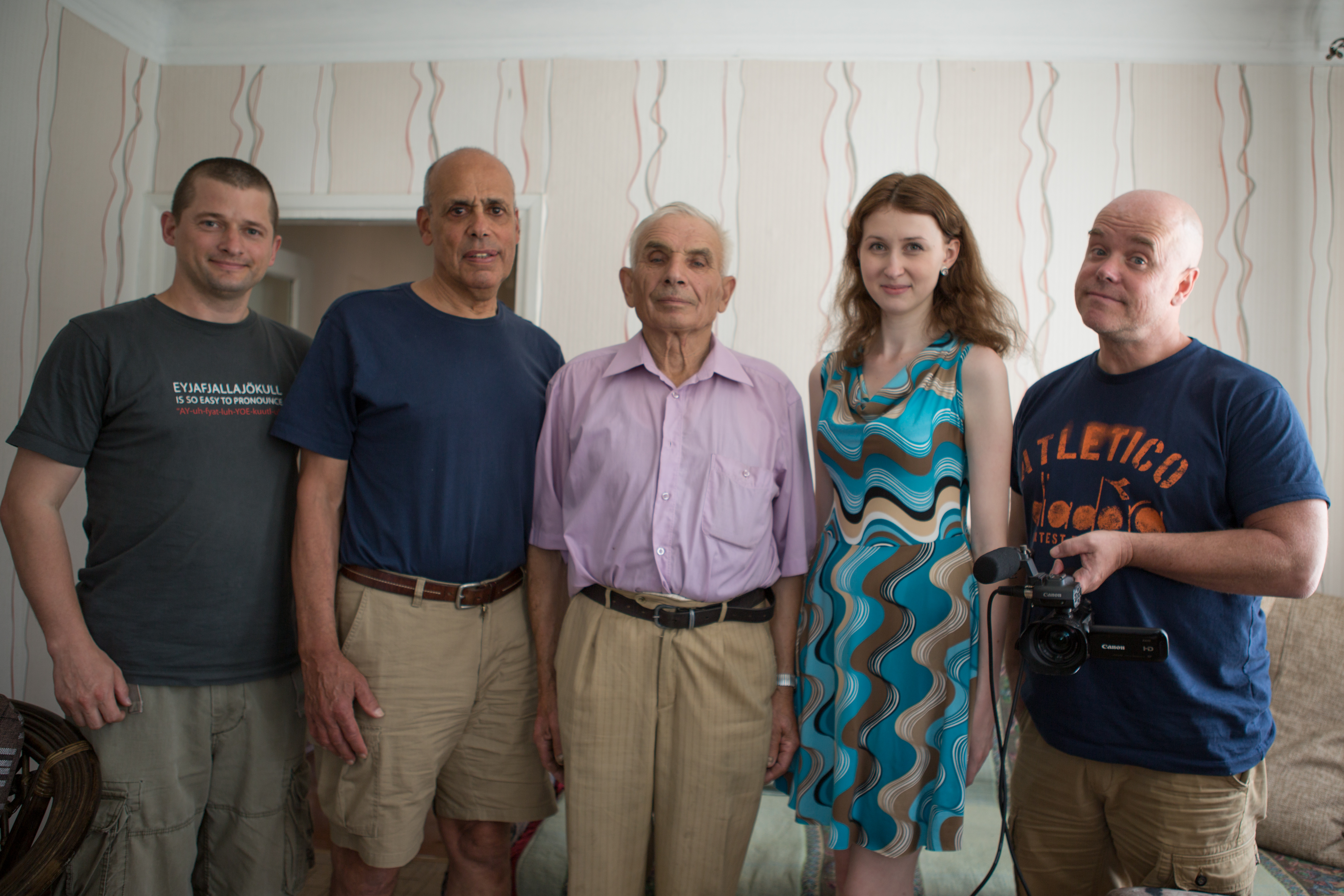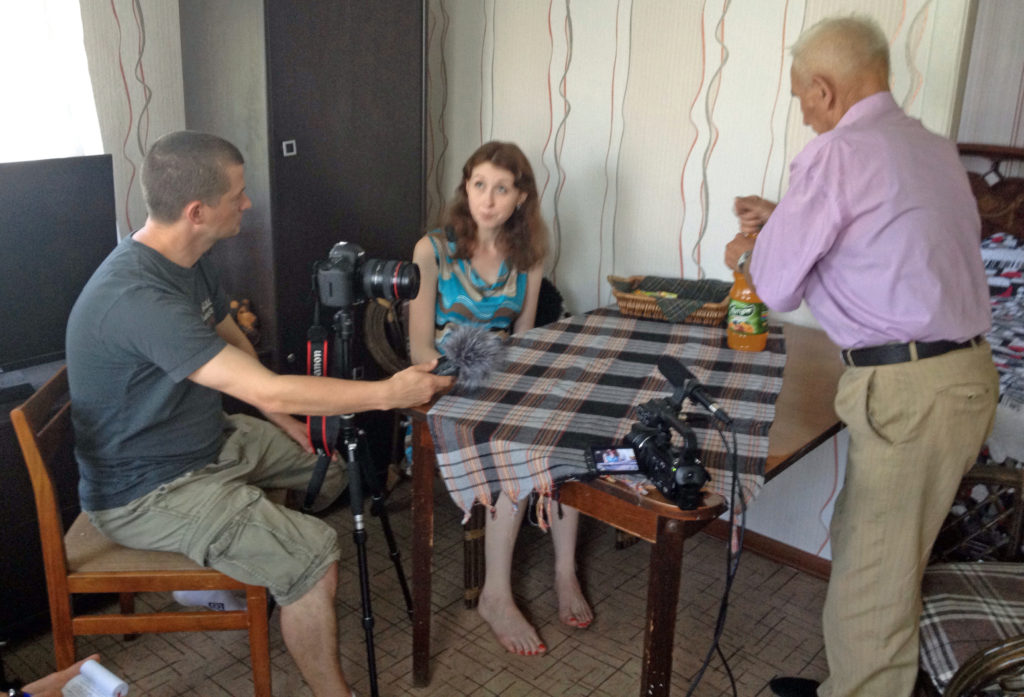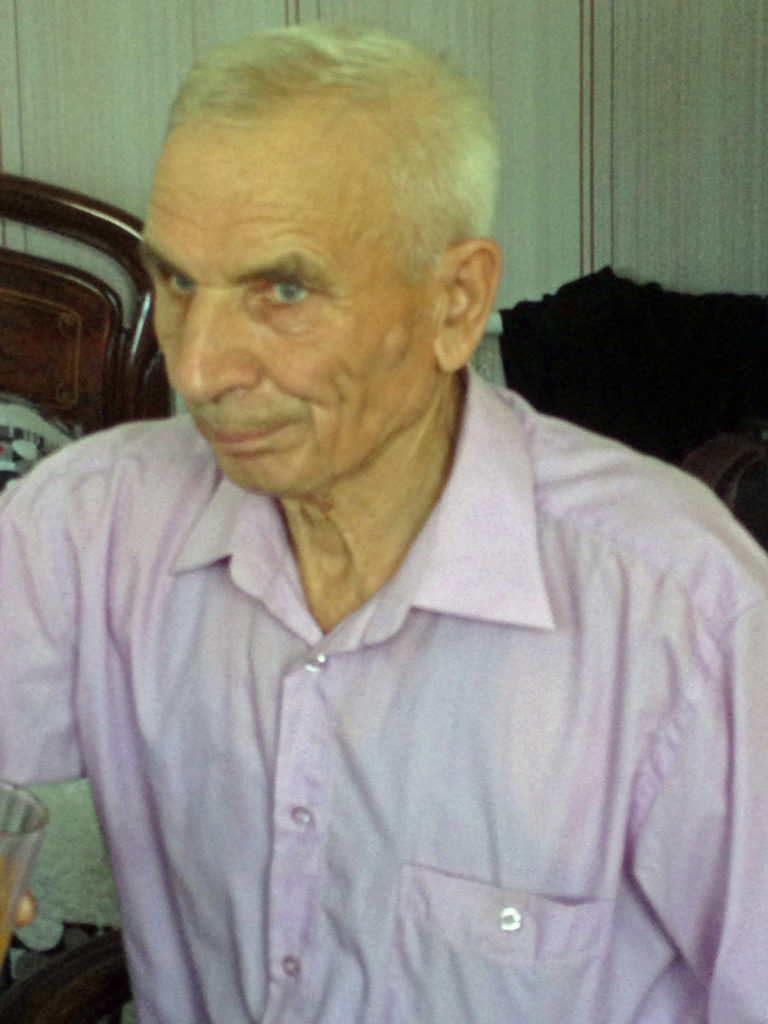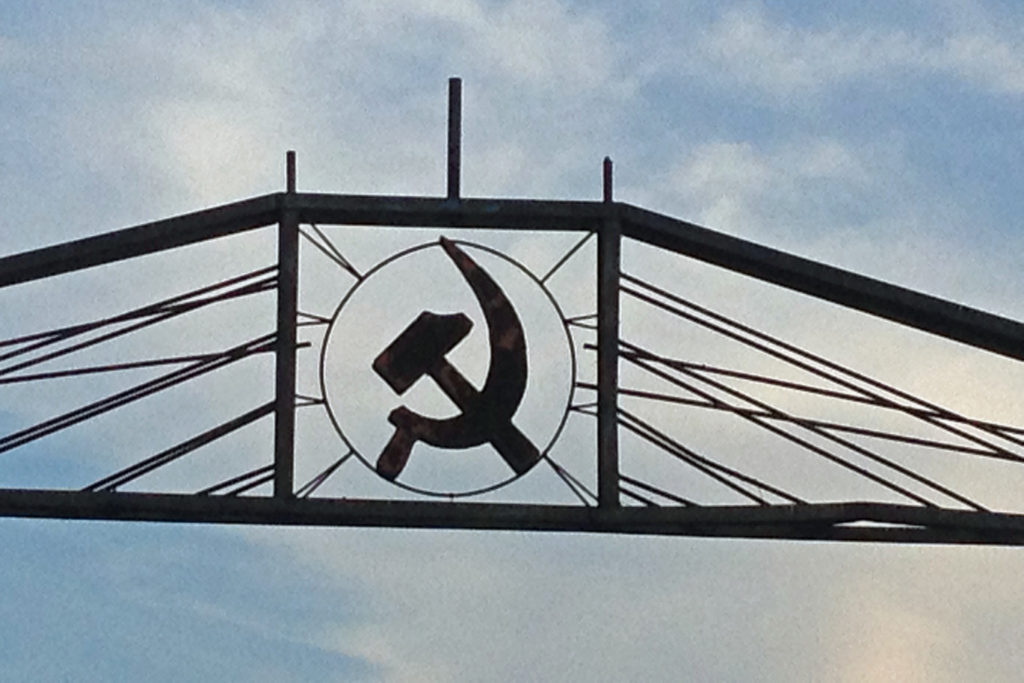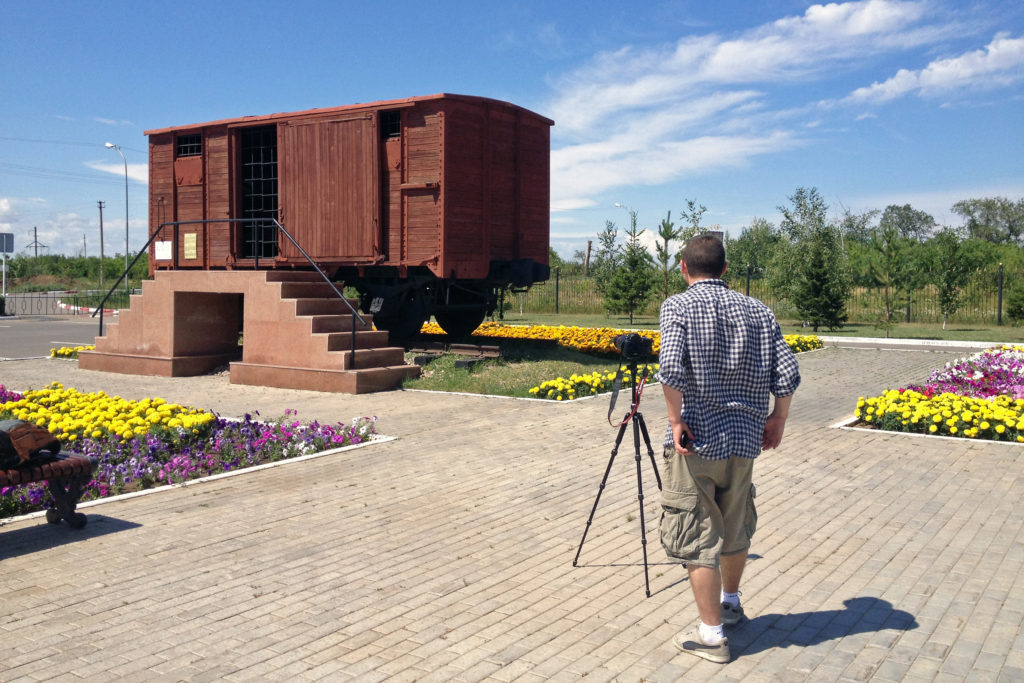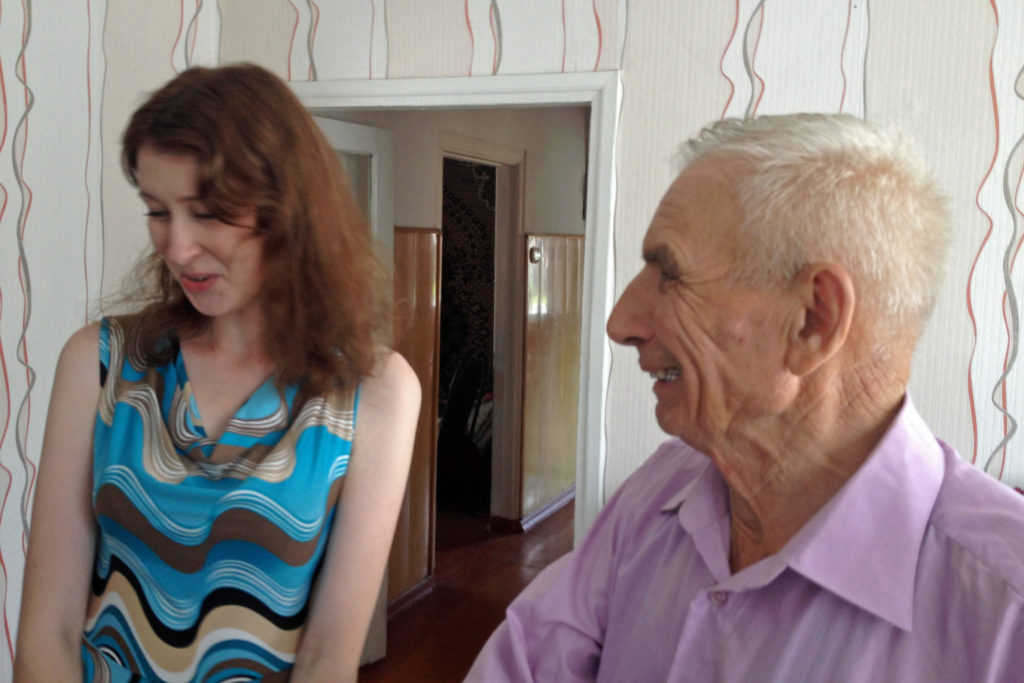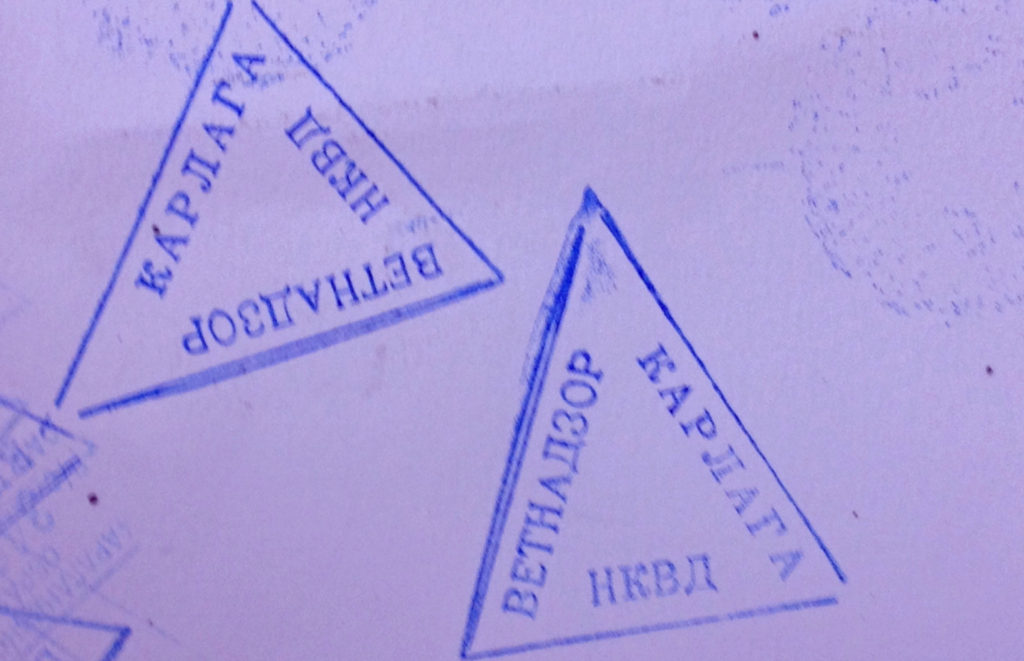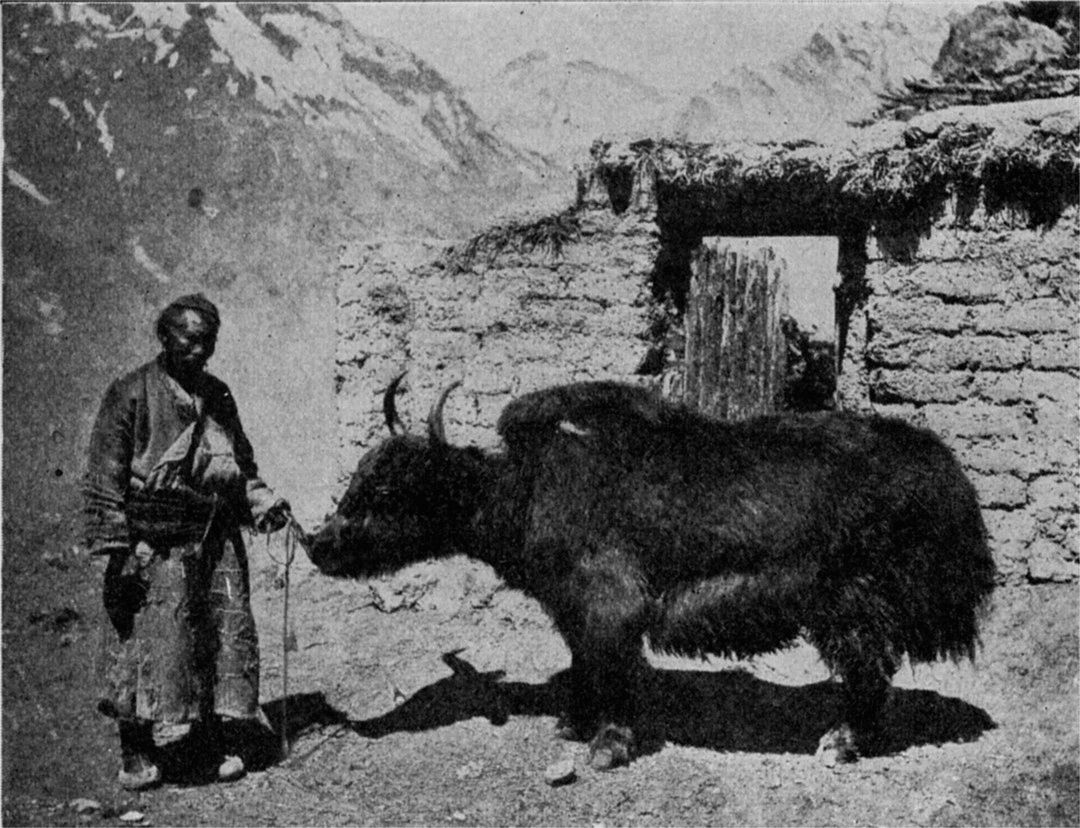The Kengir Uprising. Alexandr Solzhenytsin wrote a whole chapter in his extra ordinary book “The Gulag Archipelago” about the 40 days of prisoner resistance ending in a bloody massacre of inmates by Soviet forces, in May and June 1954. It is a harrowing, profoundly tragic and inhuman read. But, there´s no doubt it is also a good insight into the darkest side of human kind and a substantial part of the Soviet regime during this time. I had problems sleeping after the first time I read it in Solzhenytsin´s book. It was almost unreal an hard to believe that such evil could exsist. At least until you meet somebody who´ve been unfortunate enough to be part of this sad episode.
It was an incredibly hot day when we first met Ivan Karpinsky. 40 degrees Celsius. So hot it was hard to think. And when we arrived to Ivan´s home, a traditional one floor house with a garden in full bloom, he wasn´t there. A curious neighbour said he´d gone to the shop and was on his way back. And whilst we were talking to the neighbour we saw Ivan coming full speed down the dirt road towards us with determination and strength. Or maybe he was just stressed out to be late for our meeting. He arrived with a plastic bag full of bottles of Sprite, Fanta and cookies.
Once inside his comfortable house, we sat down at a small table and he brought out pictures showing this sad part of his life. And with great passion he started to tell us his story.
“I was born in Ukraine, in 1932. Until 1939 the whole territory was Ukrainian. In 1939 there was a secret agreement between Hitler, Ribbentrop and Stalin. Our border was located along the Syan River. In 1945, during the Yalta Conference our territory was given to Poland. The half of Lvov region, four districts. So we lived under Poland. According to the agreement all Polish were to be exiled from the USSR to Poland. And we were sent from Poland to the USSR. It’s called the ‘Curzon Line’. Remember, the ‘Curzon Line’? I lived out of the Kerzon line, in Poland out of the Curzon line. We were deported by force. We didn’t want to live in the Soviet Empire, in the Soviet Union. Because, we knew what the Soviet Union was. It’s terror, violence, concentration camps and collective farms. We knew about collective farms and starvation, because we lived under Poland and knew about everything. Our press was free and we knew what was happening here. We didn’t want to go. We were deported by force. We didn’t want to leave that is why NKVD troops were sent to us. Polish and Soviet NKVD encircled our village and burnt it entirely. 93 men were executed. My father, grandfather and aunt were killed. I ran away in to the neighboring village, that’s how I saved myself. When I came home everything was burnt. It was March, 23, 1945.”
Ivan was agitated and we all felt the pressure of being part of his story. It was that powerful. I felt tense and concentrated.
“That’s how communists treated us.” he continued: “Burnt our villages because we didn’t want to come here. We didn’t want to live in the Soviet Union. But we were sent here. We were hiding in forests for the whole year, we didn’t want to go. We were hiding for a year, we didn’t want to go. We hid in forests. After, we were surrounded and exiled to the Soviet Union. We didn’t have anything. We were naked and barefoot. I lived as a hungry beggar and cried all the time. I was with my mother and sister. We were so hungry. After we were sent to a collective farm. In the collective farm they didn’t give us anything. We worked there for a year and earned nothing. They only drew lines at the end of each working day. Almost everything was for the government and the rest for us. And you had no right to say a word. “
Ivan seemed exhausted. We knew from the interviews with other prisoners and people with memories of KARLAG, that after an interview like this, they suffered terrible neighmare´s for weeks to come. It was opening up the worst can of worms. Ivan continued:
“If you said something they said:
“Are you against the Soviet Power?”
“Don’t you like the collective farm system?”
“After this, I ran away to the city. In the city I studied carpentry. It was in the 50s. And in 1953 after Stalin’s death…..We had a library at home. One man gave me a book about Ukrainian history, which was written before the Soviet Union time. I read this book and retold it to my friends. One guy rose to provocation and said:
“One man reads books and knows the History of Ukraine very well.”
And I was arrested. March 8th in 1953. On the 8th of March. Ten people came. They surrounded our hut, turned it upside down looking for something. I even wasn’t properly dressed. I was arrested, brought to a prison and they started to beat me. I told them that I wasn’t at war, I didn’t have any weapon. Can you imagine?”
“No, you wanted to overthrow the Soviet government and Ministry of Defence”.
“But how could I? I was at school only for six years. I didn’t understand anything. And in April, 23 I was sentenced to 25 years in prison.”
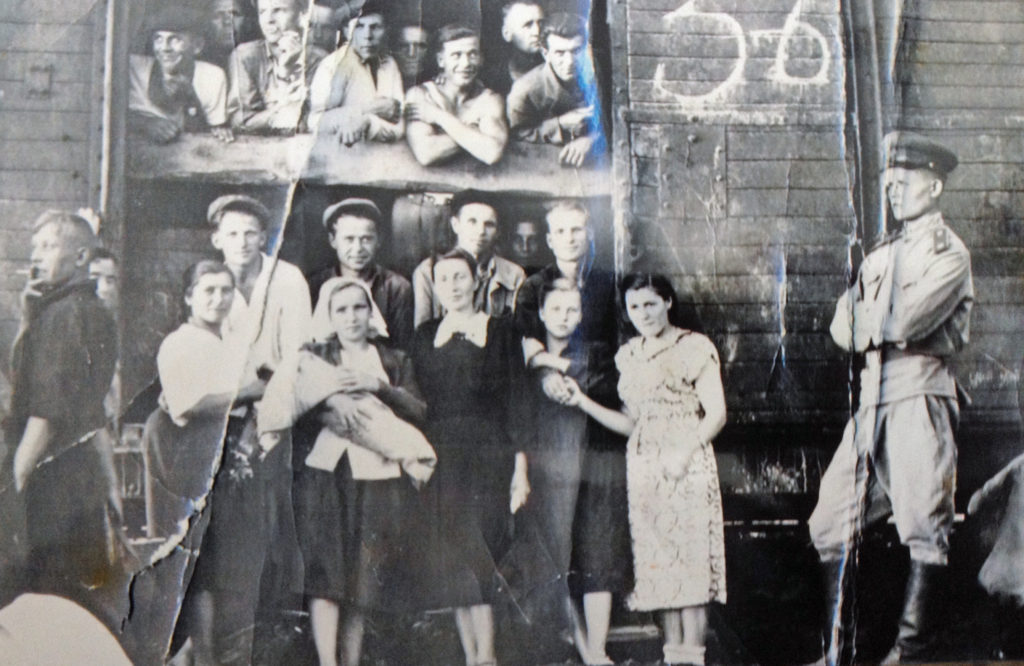
Ivan was crying. The pain was immense. My heart almost stopped. A few seconds of terrible silence followed. Ivan continued:
“My neighbor was also arrested for nothing and two girls on my street. Four of us and two girls were sentenced to 25 years of prison. Do you understand?”
“Their aim was, translate it” , he continued with anger: “Stalin’s aim was to kill all Ukrainian people. All the youth were arrested on streets. From 1917 to 1930, their aim was to kill all Ukrainians. Children were arrested on the streets too. Children were in prison. It was pure fascism. Pure!”
“My two friends and I went in a city to buy some ice cream, and suddenly we were surrounded and asked why we were there standing and talking? NKVD were like wild animals. After, they held and questioned us for half the day as to why we were walking and talking? Do you understand? Even in the daytime it was forbidden to talk. And the NKVD was in every village. There was armed NKVD troops across the whole of west Ukraine. It was forbidden to go out at night. That’s how it was in the 50s from 1945 to 1956. Up until 1956 the NKVD troops were in West Ukraine. There was such a regime. If I told about it now, nobody would believe me.”
“Old man, what are you talking about?”
“Youth can’t imagine what had happened with us.”
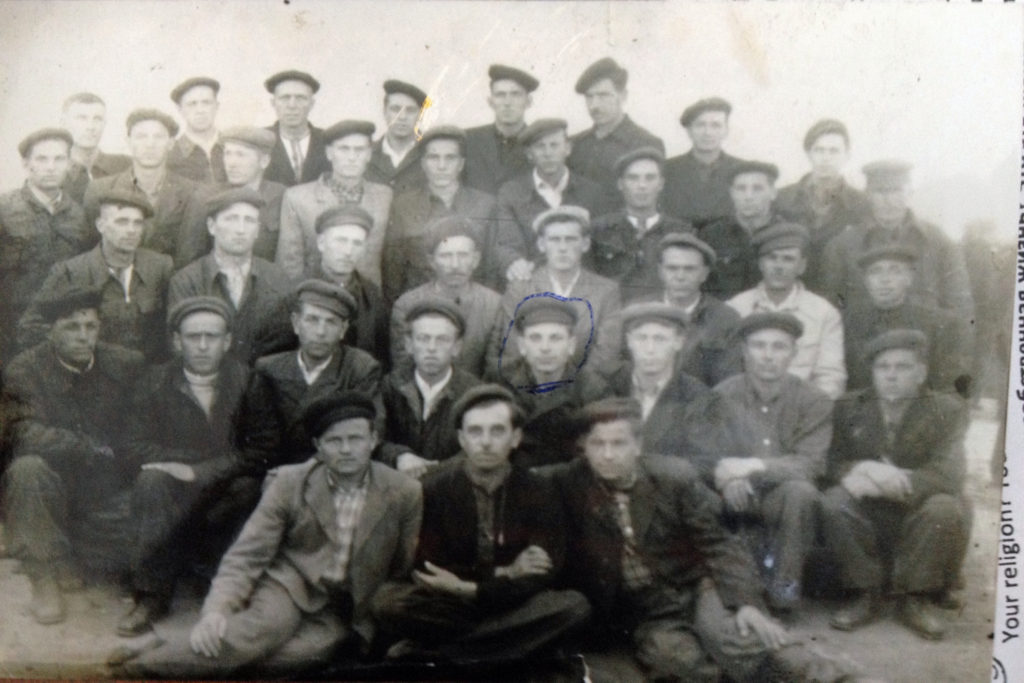
“After the court we were driven throughout Siberia, to all transit prisons. Novosibirsk transit prison. Kharkov, Kiev. On purpose they put us ‘politicals’ in prison cells where criminals were held. Until 1949 all criminals and political prisoners of both sexes were kept in camps together. But in 1949 they were separated after Stalin’s decree. Those who were convicted under article 58 were kept separately. But on purpose Cheka officials put political prisoners in criminals’ cells to taunt us. Three of us boys were walking then suddenly we were arrested and put in a cell with words that we were political prisoners and Banderas. After we were beaten and they tortured us. After we got to the Krasnoyarsk transit prison. Krasnoyarsk transit prison was a kilometer square in size. There were two or three echelons full of prisoners. From Krasnoyarsk transit prison we were sent to the North, to Norilsk. I arrived there in August. This transit prison wasn’t only for German prisoners of war. There were about 130 nationalities and most were prisoners of war or students. Can you imagine? It was horrible time.”
“And criminals were also in there with us. We lived in separate barracks and once the Cheka officials wanted to burn us. Can you imagine?”
“But soldiers said that they hadn’t died during the war, and they would survive at that time. Can you imagine? It was horrible. But we didn’t arrive in Norilsk. Water froze in a river. That is why in December. I was sent to STEPLAG, in Kazakhstan. There was STEPLAG, KARLAG, and PESCHANLAG. Three administrations. Thirty-two concentration camps. Thirty-two concentration camps in the Karaganda region. Nine women’s in Malinovka, Dolinka, Aktas and Kirzavod. I got to Kengir – this is in STEPLAG, in Zhezkazgan. 600 kilometers from Karaganda. A special concentration camp. Can you imagine?”
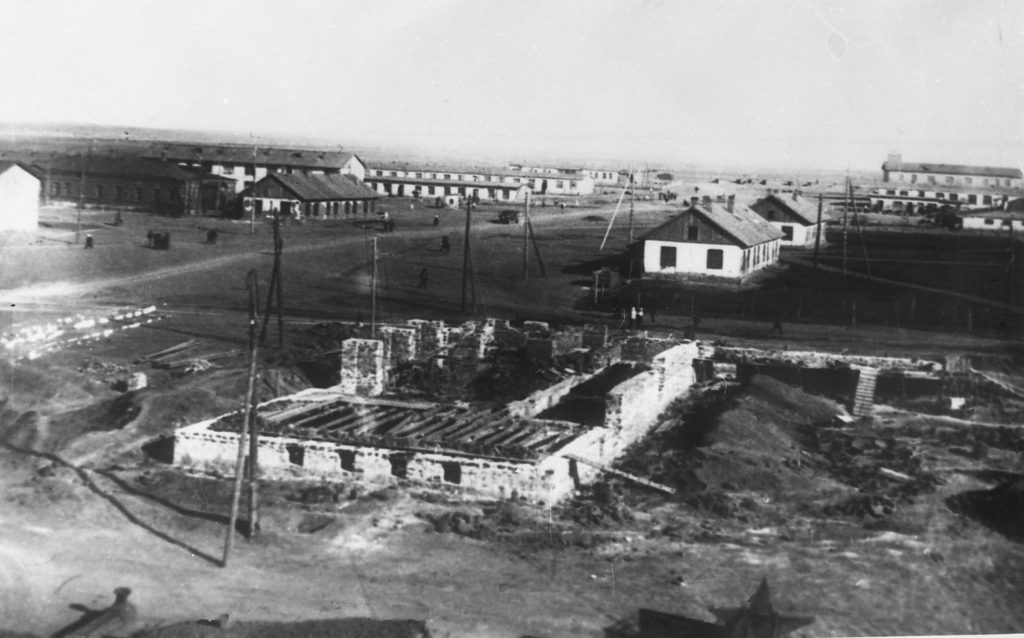
“The village was named Kengir, near the Kengir River. It was empty land but after was built a copper enrichment factory and women built the village. We were building the town and going to work. There were German, Romanian and Czech prisoners of war in the camps, but most of all there were POWs who had reached Berlin. (Soviet soldiers.) When they crossed the border and after were arrested. They were with us. They asked why we were there? And they told us that they were at war and were captured and afterwards were put in the camp. Can you imagine?”
“Tell us more about Kengir” , I asked.
“There was a commander. His surname was lieutenant colonel Burdyug. Duty Head was Belyaev. They were two cannibals. And the head of the camp was Jewish but I don’t remember his name. He tortured us. In 1954 men and women were walking after work and congratulated each other on Easter. A guard killed 16 people at once. Then they set dogs on us. Belyaev was watching this and shooting anyone that he wanted. If you see the film “Cannibal” everything was the same as in the film. They taunted us. The cause of the revolt was humiliation. But that is not all.”
“There was a KGB operation group with their commander in each camp. They knew that there was a secret organization in the camp but they didn’t have access to any information in the camp, because prisoner used to drown snitches in wooden barrels. Everybody was so scared so they didn’t tell a word to authority and authority couldn’t recruit anyone. Who would betray friends?”
“So in April the authorities brought in criminals, I think it was on the 15th of April, I don’t remember exactly. They brought 500 criminals who had two or three convictions. They were from Ekibastuz, Siberia and Kamsk. They did it on purpose. There were two prisons. Two for men and one for women. If I had a map, I would draw it for you. I used to draw a map. There were two thousand women and two thousand men. They were placed in a special quarantine. There was an isolated prison, quarantine prison. Those prisoners were kept for twenty days and the authorities worked on them. They were told the when they got access to the whole camp they’d become mentors, foremen and cooks. The whole camp would be theirs. They’d be pure Soviet people and would be in charge of us traitors of the motherland. The first prison was for women and the authorities said that they’d get access to it too. Nobody would touch them, not even the guards. They were released on the 15th. They immediately went to our parts of the camp. But our people met them, started to beat them and didn’t let them enter. Suddenly guards appeared and executed 30 people. The next day we went on strike.”
“We went on strike and created a special committee consisting of twenty people of all nationalities. On the canteen’s wall we wrote the motto:
“Death or Freedom!”
“The head of the committee was traitor Kuznetsov, we found that out only at the end. He was specially sent to us. After he betrayed us. Do you know what the authorities did to provoke us after we had gone on strike?”
“There was a railway near the camp so they brought tanks, sorry no, tractors. Two tractors were driving around the camp. The camp was encircled with three rows of trenches and two NKVD regiments. They thought when they broke through somebody would run away. But who would face up to the bullets? What an idiot! NKVD troops were sitting in three circles around the camp. And tractors were driving around only in the evening to provoke us. And at that time five tanks were unloaded. This was at 4 a.m. on the 16th of May.”
“On the 16th of May a plane made two circles around the camp and shot rockets at 4 a.m. We immediately woke up and ran out of the barracks, then we saw tanks and behind them were soldiers shooting everybody. Belyaev, Kuznetsov and Chepel were there and later a (Soviet) minister arrived. He was after Beria…ah, Kruglov! He was short and wore a white coat; all of them were standing there and giving orders. Everything started. Women ran to the third canteen, thinking that tanks wouldn’t reach them. But tanks knocked it all down. They fired cannons at the barracks. At first we ran out of the prison but when soldiers started shooting us we came back to the barracks and slumped to the floor. But they fired blank bullets at barracks. Soldiers threw smoke grenades at us. They wanted all prisoners driven out of the camp. They prepared carriages to send us to closed prisons. It was from 2 p.m. to 4 a.m. It was hot like today. Can you imagine, it was 40oC?”
“It was so hot. In short, all of us had to be sent out of the camps and the other 150 people….No, I think there were more of us. Finally, the young people were driven out the camp lying face down. Belyaev and some of the cannibals were walking with guns and killed anyone who put their head up. Well, we were driven out from the camp lying face down. We were down like that till the evening. It seemed to us like we were frying in the pan. Can you imagine this? Without any water. How can people live without any water?”
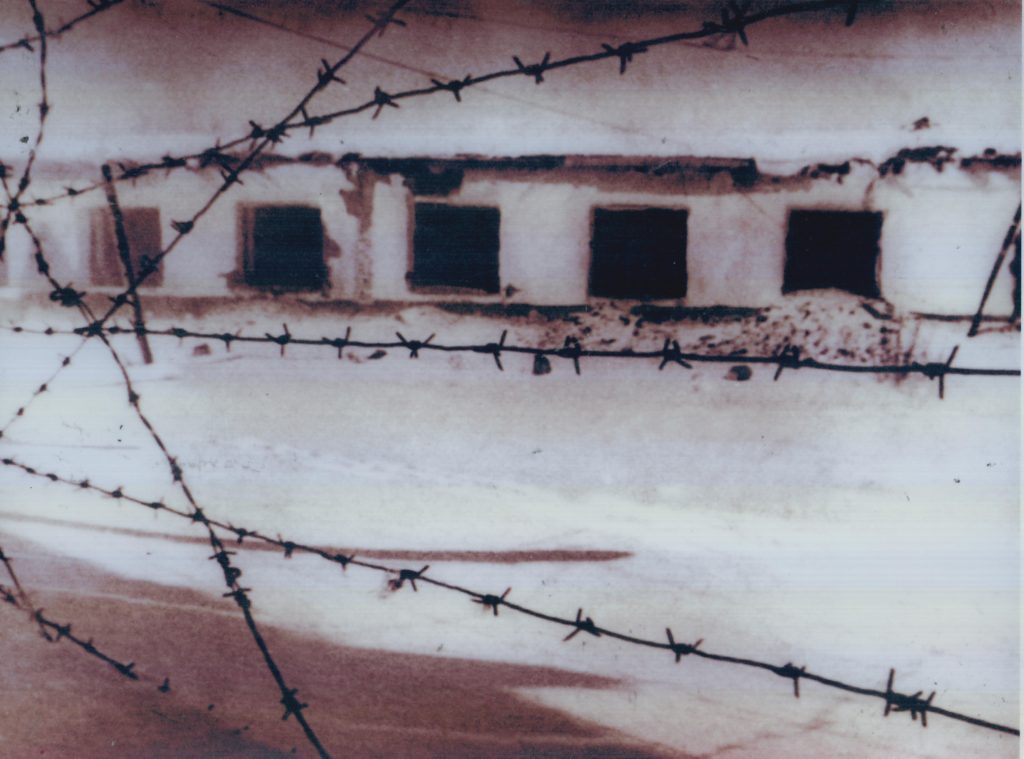
“In the evening they put us in two Pullman carriages which carried ore. One hundred tonne open iron carriages. They carried ore from mines to an enrichment factory. These carriages stopped on the hoppers and when the button is pushed the carriage turns over. We were put in these carriages. Can you imagine? It was an iron carriage and they put us inside. Later a locomotive took us and we went somewhere.”
“They brought us to the enrichment factory. A guard was sitting on top of the carriage. Four armed people. And then we realized why they were carrying us to the enrichment factory. We could’ve driven passed it, but they took us to the enrichment factory. Do you understand? What was their plan? When two carriages stopped on the hopper, the guard got down and silence fell. Only one button push and we could fall down into the 40 meter hopper and be buried with ore. This minute was …”
“Sorry, I can’t. We were holding each other and waiting for our death. Silence! The most horrible thing is the silence. It is like somebody is holding a pistol against you and you’re waiting for your death. We were wet, holding each other and crying. Such death! And silence, and then we heard the guard get up. The guard got up and we started to move. They were two of them, one order to execute, another….At this moment they were thinking over…….”
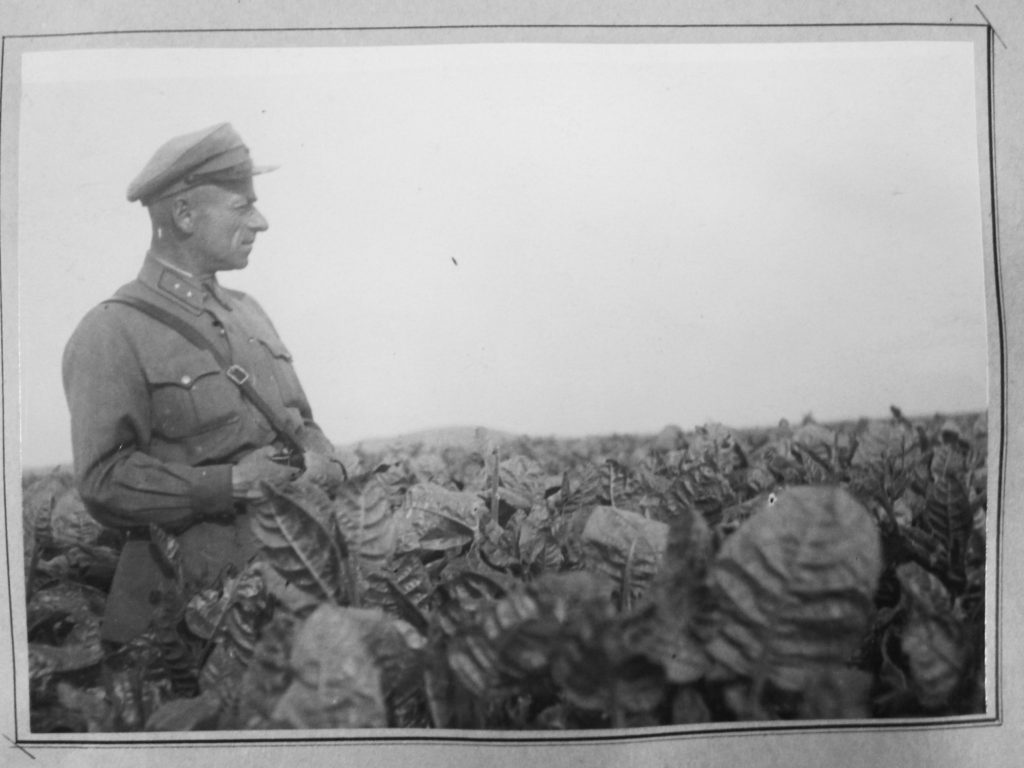
“I don’t know who? But the carriage moved and they carried us all night. I don’t know where. In the morning we were 20 kilometers away, no 30 kilometers away, to another camp. We fell down from these carriages. We couldn’t walk so soldiers supported us by our arms. This camp was completely different with different commanders. The camp head was a very good man. These people were different, they weren’t like wild animals.”
“In Rudnik we worked in mines. It was easier to live there; it was STEPLAG, but it was another camp with different people and authority. I worked in a mine. The authorities were good and we could study there. I did a drivers and engine drivers course. The head of the camp was Alexandrov. Strangers couldn’t get in and nobody recruited anybody. Everything was there, even a choir. Completely different people. Do you understand?”
“Then 1956 when Khrushchev opened the gate, they started to release us. Except me, I remember that they reduced 17 years of imprisonment, because I had some credits. I was in prison for a year in Balkhash then we were brought to Karaganda in December, 1956. The “Shygys” market used to be in camp #14, and I was there. I was there for 3 months. It was a prison. From there I was released, but wasn’t allowed to return home. They asked for written authorization to arrest and bring me back if I returned to the Ukraine.”
“When I start to remember this, all the time I feel bad and probably after your visit I will be ill. Do you understand me?”
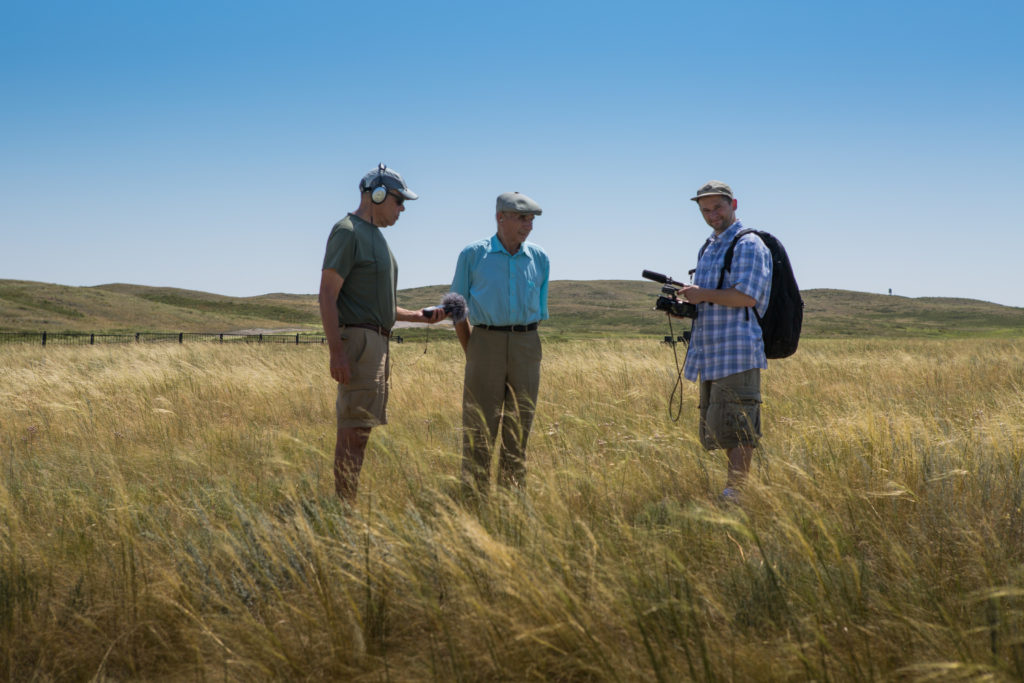
“I’m old, I’m 84. Yuliya, I want to finish at half past two. My daughter lives with such a man, they don’t understand all this, and they don’t want to know because they don’t care. Do you understand me? I’ve told you everything.”
“When I arrived in Karaganda, there were a lot of our special settlers, Ukrainians. So, I settled down here. After I went there (Ukraine) a couple of times but they didn’t register us. Until the 70s they didn’t register. They didn’t register us. The KGB kept a file on all of us. Of course I go to the Ukraine, my wife moved there and I will leave Kazakhstan. I won’t live here. But you see what is happening in Ukraine? Here I have my pension. I worked here and built a lot.”
“Here I found a girl and got married. We weren’t allowed to live there. We were not allowed to live there. Only NKVD and KGB people could live there, but we couldn’t.”
“Do you remember how you reacted when you got arrested?” I asked.
“You know, I didn’t say anything, I was in shock because I didn’t know why? I don’t know what to say? When I was arrested I had known that it was for nothing. I knew that a lot of people were already arrested. From my village they arrested ten boys for nothing. For nothing! For saying a word. When I was brought to prison they started to taunt me. Can you imagine? Ten Cheka officials were sitting and beating me from one corner to the other? After they put me in a cell where there was a beaten guy. He said that when you get here, nobody can get out. And I had to say “Yes” to everything. “Yes Yes Yes”!
“They said I wanted to kill Stalin or blow up Moscow. They would write anything they wanted. Next day we were taken to interrogation at 11 p.m. They kept us till the morning. And Vorobev investigator told us not to speak because nobody could get out. Nobody and never, he said to me. He wrote nonsense and gave it to me to sign. And I said him that I hadn’t done it. Why he had written that I wanted to blow up railways? Can you imagine? What nonsense! I asked him why he was writing this but he just took my head and hit it the wall. They did with us whatever they wanted, they could beat and throw us back in the cell. And that guy told me that it was useless, that I wouldn’t get out of here. Then I was judged, but I didn’t cry. My friend cried and asked everyone why he was sentence to twenty-five years? I thought that it would be my grave. That nobody could survive twenty-five years in prison. It was the end. But I didn’t cry … now I am crying. But at that time I didn’t.”
“Why do you think you survived when many others didn´t? “ Ken asked.
“I was young and healthy. This is what I had to try to go through. And the Holy Mother saved me. Many times I fell down off the construction site. There were a lot of deaths. But I stayed alive. I stayed alive to tell everybody what happened during those times because many witnesses have died and some of them are still alive but don’t remember anything. But I remember it all because I have a very good memory. I’m 84! And you see I try to be calm. But I am too emotional now. They tortured us!”
“I want to add one thing. When the war started Hitler tortured us too. In Germany all the youth were taken to work. Taxes, and they wanted to burn our villages because of some provocations. Can you imagine? Several times they tried to do it but they didn’t because German people thought that the people were innocent. And we weren’t people for Checka officials. We were saved by the Ukrainian army. An army against Hitler and the Soviet Union. One hundred thousand army. And all our youth was against. Millions of our people. You need to understand that Ukraine wanted independence. Every family wanted to be united so our country wanted to be independent. 350 years we were under the Tsarist Empire and in Soviet, Stalin’s empire alone 12 million people died of starvation in the West Ukraine in 1932. And in 1939 all students and teachers were arrested. All literate people were executed or they were kept in prisons in 1940. In 1939 they had come and in 1941 all students were in prisons or executed. They killed 900 priests and those who studied at universities. They wanted to kill literacy. And keep ordinary people who wore sailor jackets. My neighbour was called as a bourgeois because soldiers saw that he was wearing an embroidered clean shirt and he had a caw. If you were tidy dressed and wore a tie it meant that you were an enemy. And if you wore torn clothes – you were a proletarian. Do you understand, they didn’t need clever people. They had to kill all clever people because with the foolish they could do everything what they wanted. Tell them black they repeat black. “
“You see, I am running here and there. Movement is my life. Idon’t lye and sleep whole day. I don’t drink and smoke. And when I am looking at beautiful girls I feel that I am still alive.”
*Read all articles at http://www.mikaelstrandberg.com/?s=karlag
